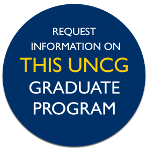Doctor of Philosophy
Mentor Mentee Guideline
A healthy and productive mentor-mentee relationship is one of the most important relationships for a PhD student. There can be many different successful advising styles but we believe they share similar elements. Belows are the expectations for advising in the UNCG Computer Science PhD program, both for students and faculty.
Faculty should:
- be professional, supportive and inclusive in the management of their research group and conduct of research advising; not abuse the power imbalance in the mentor-mentee relationship;
- respect students’ diverse career goals and help them achieve their chosen career goals by providing relevant training and development of necessary skills;
- advise students on the selection of a thesis/research topic and assist them in choosing appropriate advisory committees;
- be explicit and clear as possible when assigning research duties to students;
- meet regularly with students to provide feedback on research activities and progress;
- respect students’ competing demands such as research, courses, GIA duties, and others, and help students maintain a good work-life balance;
- be sensitive to academic integrity and avoid placing pressure on students to generate results that support specific hypotheses;
- be a role model and maintain high standards in their conduct.
Students should:
- be responsive, proactive and take the initiative for communicating with your advisor. Do your best to keep good communication with your advisor.
- identify educational and career goals and talk with the advisor;
- be self-motivated about improving their research skills, including manuscript written and oral presentation skills;
- be professional in your reception of criticism. Be open-minded to other points of view;
- respect your advisor’s ideas, opinions and experiences in the respective disciplines;
- address concerns and issues raised by the advisory committee in a timely manner;
- maintain the highest ethical standards in all aspects of their research.






